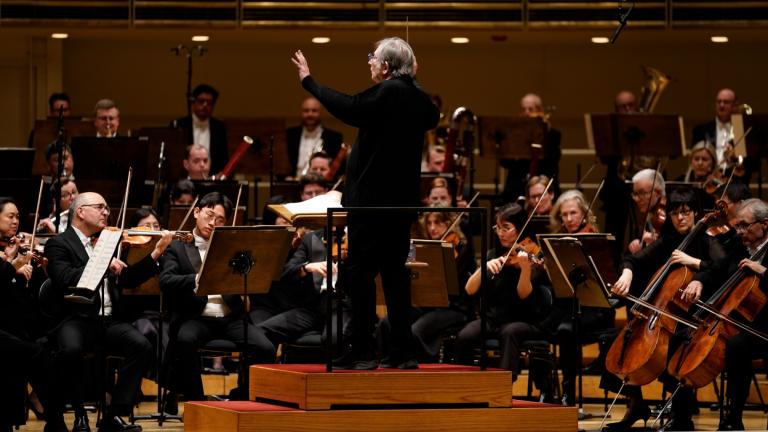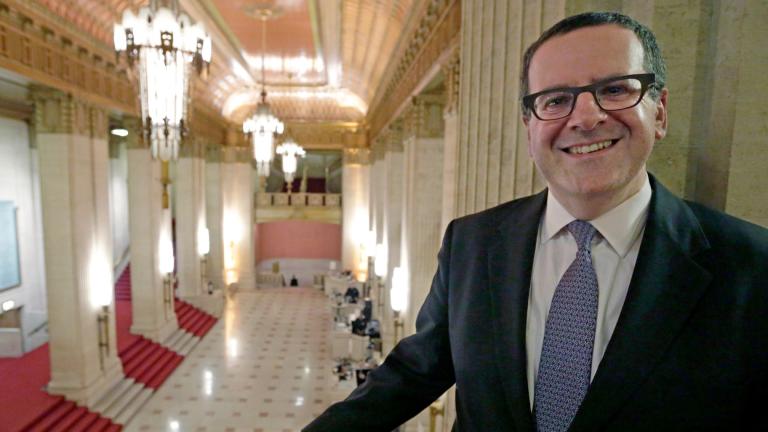World-renowned soprano Renée Fleming has a new project – but it’s not a new opera.
It’s a book called “Music and Mind” – a collection of essays curated and edited by the operatic superstar exploring the healing power of music and the arts, and what modern science is uncovering about that connection.
The book features a wide array of essays from scientists, artists, therapists and more – including novelist Ann Patchett who authors an essay on “How to Fall in Love with Opera,” cellist Yo-Yo Ma on “Nature, Culture, and Healing” and neuroscientist Daniel Levitin on “What Does it Mean to be Musical?”
In an interview with WTTW News, the singer explained how the idea for the book came from a dinner she attended with three U.S. Supreme Court justices and the director of the National Institutes of Health.
“This wasn’t just any dinner because it was the day after marriage equality was decided,” said Fleming. “And so the three justices were not as chummy as they normally are. And Dr. Francis Collins, who was the head of the National Institutes of Health for 12 years, brought his guitar as I’ve since learned he always does.”
After an impromptu singalong that lightened the mood, Fleming, who had recently begun working as an advisor at the Kennedy Center, learned from Collins about the NIH’s BRAIN (Brain Research Through Advancing Neurotechnologies) initiative.
“I find the work that scientists are doing now in terms of researching music amazing,” said Fleming.
She learned from Collins that music is found in every known mapped area of the brain.
“It’s a very complex kind of series of processes that human beings have to do to engage with music, to play, to listen,” said Fleming. “And it’s something we take for granted because it’s the air we breathe, it’s everywhere.”
The fact that music seems to engage all aspects of the brain makes it “pretty unique” says Fleming.
“There isn’t anything that’s quite that widespread. That’s quite kind of part of our DNA,” said Fleming. “We know a lot of this. We musicians obviously really know it. But science is beginning to know it in a way that will impact people’s lives, impact our health care system and, I think, begin to solve even more issues that we’re having.”
Fleming noted that music therapy has proven particularly effective in treating patients with Alzheimer’s disease and other forms of dementia for whom music memory is the last to go.
“A lot of people who have been around care facilities have seen this happen,” said Fleming. “That someone doesn’t know any of the people around them or can’t remember much of anything, and yet if you start singing a song they know all the lyrics perfectly.”
Music therapy also seems to help patients with movement disorders caused by a stroke or multiple sclerosis, a chronic disease that attacks the nervous system.
“All of these patients can benefit tremendously from music because suddenly, if they couldn’t walk or they’re shuffling or freezing, if you put on a rhythmic beat with something they’ll suddenly move gracefully,” Fleming said. “So there are a lot of ways in which music, because it’s in different parts of the brain, can help us bypass the problem areas and inspire us to be able to do things.”
Music – more specifically singing – is also helping people who, through either brain injury or disease, have lost the power to speak. A treatment called melodic intonation therapy can help, says Fleming.
“One session can give you the power to communicate again because you’re bypassing the speech area and going to the singing area (of the brain),” she said. “And suddenly you can communicate because the words – you can sing the words – but you can’t speak them.”
Fleming’s hope is that music and other forms of artistic therapy will soon become “embedded in our health care system across the board.”
Currently, health insurance companies are reluctant to cover such treatments – but that may soon change as the research is validated through large-scale studies.
“The fact that the National Institutes of Health is now funding the research is a massive game changer,” said Fleming. “And that is really turning the tide and what we’re seeing now as a result is that the entire sector and the field is exploding in a really wonderful way.”








